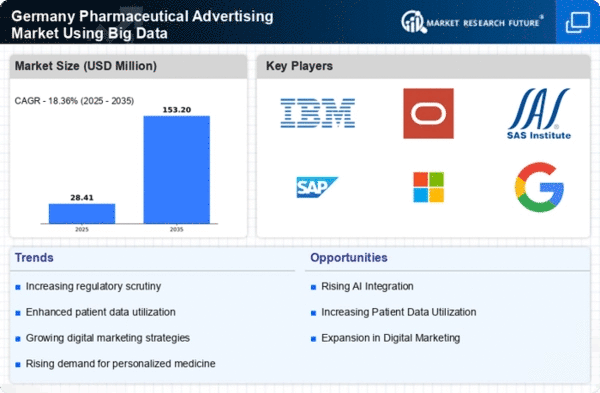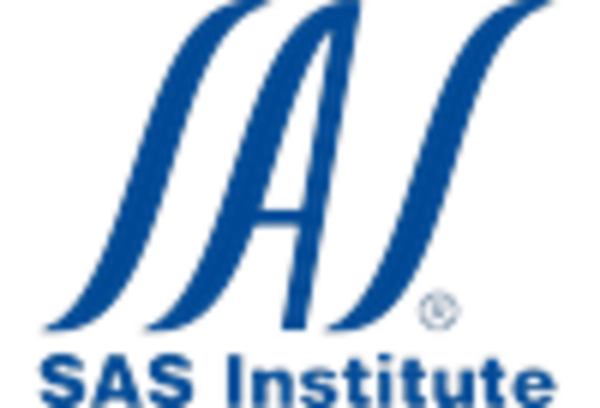Rising Demand for Data-Driven Insights
The increasing demand for data-driven insights is a pivotal driver in the big data-pharmaceutical-advertising market. Pharmaceutical companies in Germany are increasingly leveraging big data analytics to enhance their marketing strategies. This trend is evidenced by a projected growth rate of 15% in the adoption of data analytics tools among pharmaceutical firms. By utilizing big data, these companies can better understand patient behaviors, preferences, and treatment outcomes, leading to more effective advertising campaigns. The ability to analyze vast amounts of data allows for targeted marketing efforts, which can significantly improve return on investment (ROI). As the market evolves, the integration of advanced analytics into advertising strategies is likely to become a standard practice, further driving the growth of the big data-pharmaceutical-advertising market.
Increased Collaboration Between Stakeholders
Increased collaboration between stakeholders is emerging as a crucial driver in the big data-pharmaceutical-advertising market. Pharmaceutical companies in Germany are forming partnerships with technology firms, data analytics providers, and healthcare professionals to enhance their advertising strategies. This collaborative approach allows for the sharing of insights and resources, which can lead to more effective marketing campaigns. The market is witnessing a trend where approximately 25% of pharmaceutical companies are engaging in joint ventures focused on data analytics. Such collaborations not only enhance the capabilities of individual firms but also contribute to the overall growth and innovation within the big data-pharmaceutical-advertising market.
Growing Emphasis on Patient-Centric Marketing
The growing emphasis on patient-centric marketing is reshaping the big data-pharmaceutical-advertising market. Pharmaceutical companies in Germany are increasingly focusing on understanding patient needs and preferences, which is driving the demand for personalized advertising strategies. This shift is reflected in the allocation of approximately 30% of marketing budgets towards data analytics initiatives aimed at enhancing patient engagement. By utilizing big data, companies can tailor their advertising messages to resonate with specific patient demographics, thereby improving the effectiveness of their campaigns. This trend not only enhances brand loyalty but also fosters a deeper connection between pharmaceutical brands and their consumers, ultimately contributing to the growth of the market.
Technological Advancements in Data Processing
Technological advancements in data processing are transforming the landscape of the big data-pharmaceutical-advertising market. Innovations in cloud computing and machine learning are enabling pharmaceutical companies in Germany to process and analyze large datasets more efficiently. This is particularly relevant as the market is expected to reach €2 billion by 2026, with a substantial portion attributed to enhanced data processing capabilities. These technologies facilitate real-time data analysis, allowing for timely adjustments in advertising strategies based on consumer behavior and market trends. Furthermore, the integration of sophisticated algorithms can lead to improved targeting and segmentation, which are crucial for effective advertising in the competitive pharmaceutical sector.
Regulatory Changes and Compliance Requirements
Regulatory changes and compliance requirements are significant drivers in the big data-pharmaceutical-advertising market. In Germany, stringent regulations governing data privacy and advertising practices necessitate that pharmaceutical companies adopt robust data management strategies. Compliance with the General Data Protection Regulation (GDPR) is paramount, as non-compliance can result in hefty fines, potentially reaching €20 million or 4% of annual global turnover. Consequently, companies are investing in big data solutions that ensure adherence to these regulations while still enabling effective advertising. This dual focus on compliance and marketing effectiveness is likely to shape the strategies employed by pharmaceutical firms, thereby influencing the overall dynamics of the market.
















